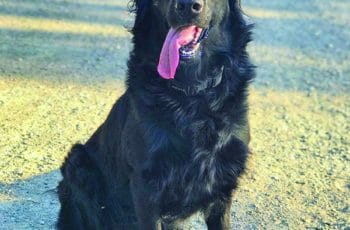Acupuncture for Dogs By Angie Hill Updated 07-06-2023
Acupuncture has been known to exist for thousands of years (around 5,000) as a health care option for pain relief and other issues that humans experience. However, the practice is relatively new for pets.
 Acupuncture for Dogs
Acupuncture for DogsIf you’re a pet owner who thinks that your four-legged friend may need the assistance of some acupuncture to overcome an ongoing issue, then it’s well worth learning the host of benefits that acupuncture therapy has on hand for your pooch.
What is Acupuncture?
To explain, acupuncture is a health treatment developed by the Chinese. It’s carried out by inserting tiny metal needles into specific areas on the body referred to as acupoints.
The doctors who did this in the early days found out that they could use acupuncture to make physiological changes, control and relieve pain in people as well as stimulating body parts or organs.
What are Acupoints?
We previously alluded to acupoints that are located along pathways referred to as meridians. These pathways are connected to the entire body, through which the vital energy, also known as Qi or “Chee”, is constantly in motion.
While the body’s meridians run deep, they do surface on the skin of both humans and their furry friends at certain points, and this allows doctors to access them through acupuncture.
In Eastern medicine, they believe that diseases, disorders, and pain occur through the “Qi” becoming misaligned, or “out of balance.” Acupuncture counteracts this and stimulates the body to discharge its own anti-inflammatory and pain alleviating substances, to bring the body back into balance and harmony.
Is Acupuncture an Effective Treatment for Dogs?
Of course, there are skeptics who aren’t convinced that this type of therapy works, but research conducted by the Journal of Veterinary Internal Medicine studied all available clinical trials and found that it was in no way less beneficial than traditional methods.
In fact, the majority of the evidence was in support of acupuncture for animals as it highlighted that it is anecdotal when consulting the pet owners themselves.
Narda G. Robinson, DO, DVM, MS published a research paper stating that scientific studies demonstrated how acupuncture for dogs can safely and effectively decrease both psychological and physical issues associated with cancer and care of it.
While a definitive answer isn’t available, pet owners and vets alike are increasingly beginning to consider acupuncture as an effective part of a wellness routine.
How Can Acupuncture Benefit Your Dog?
Most commonly, pet owners are known to turn to acupuncture for pain management in their dogs and will regularly combine it with more traditional treatment options.
Some of the strongest medical treatments, such as chemotherapy are known to cause a lot of discomfort for many dogs. Because of this, it is often teamed with acupuncture to help dogs live as comfortable as possible at the same time as fighting their health issue.
It’s important to mention that all dog owners should carefully monitor a pet that is going through the healing process. This is because when they aren’t experiencing the feeling of pain, dogs frequently re-injure themselves as a result of over-activity.
How Can Acupuncture For Dogs Help?
 Acupuncture for Dogs can be used for a wide array of health conditions.
Acupuncture for Dogs can be used for a wide array of health conditions.Musculoskeletal Issues
The common types of problems that fall under this category and can be treated with acupuncture include arthritis, hip dysplasia, and nerve injuries. It’s known to be incorporated into a post-injury rehabilitation programme too.
Skin Issues
Professionals generally see four-legged patients who are suffering from problems like granulomas, allergic dermatitis, or hot spots. Acupuncture is recognised to be an effective method of addressing and overcoming skin problems because of the ability to increase circulation.
An improved circulation advances the healing process, and also, lowering the level of pain they experience will lessen their itching responses and prevent them from over-grooming.
Emotional Issues
Traditional Chinese Veterinary Medicine (TCVM) Practitioners class emotional problems such as anxiety as a physical problem that is a reflection of instabilities in a dog’s Shen (spirit). In TCVM, the Shen is a source of well-being and happiness to arise from.
A TCVM vet will be able to formulate a treatment plan for your pet, which typically features acupuncture and/or calming herbs.
This particular point can be especially helpful for small dogs who tend to be more anxious than their larger counterparts.
This has been backed up by a study conducted at the University of Veterinary Medicine in Vienna with the research citing that from the 1,276 surveys gathered from dog owners, smaller dogs were more inclined to be of an anxious disposition.
Pain Issues
Alleviating pain through acupuncture works in many ways. Acupuncture acts to stimulate the release of anti-inflammatory, and pain-relieving hormones.
Acupuncture is wonderful for improving circulation, causing a knock-on effect that releases the neurohormones and neurotransmitters, including endorphins (a pain-relieving hormone).
Acupuncture for dogs is also available for pets who need to be treated for muscle spasms, due to the increased blood flow and release of pressure in certain areas.
Digestive Issues
Veterinary acupuncture can be used to aid in the stimulation of digestive secretions that effectively normalise digestive activity.
As we mentioned, acupuncture also increases blood flow, which means the gastrointestinal issues, such as diarrhoea are relieved.
Respiratory Issues: Common problems such as allergies and asthma can often be overcome by the anti-inflammatory and immune-soothing potentials that acupuncture offers.
Professionals will be able to assist pet owners to develop a treatment plan that fits their pooch’s needs to get the result they need. Acupuncture can also be used alongside other traditional medicine to help them enjoy a more comfortable life.
Cortisol Release
Acupuncture for dogs is effective at helping to release cortisol; a natural anti-inflammatory hormone. Cortisol is also referred to as the stress hormone as it is released naturally by the body when stressful situations arise.
What’s more, acupuncture enables the body to cope with stress more freely, thanks to the improved functions of the body.
How Long Is an Acupuncture Session?
Treatments are individual to your pup and are treated as such. Everything from the acupoints that are going to be honed in on, to the number of needles and the length of treatment will all vary on the needs of your pooch and their current condition.
Because acupuncture with dogs is performed with tiny metal needles, your four-legged friend will most likely not even feel the needle being inserted. In fact, a large proportion of furry patients end up nicely relaxed and comfortable, while some are so content that they drift off to sleep during the session!
As a general rule, one treatment will last in the region of 10 to 20 minutes. Most pets will be seen once or twice a week, to begin with, after which they can be tailored – usually reduced – depending on the progress of your pet’s treatment.
Do Dogs Experience Any Side Effects from Acupuncture?
Thankfully, acupuncture is near painless for small animals. Your pet may experience feelings like numbness and tingling as this has been noted in the human practice of the therapy. Therefore some pups may display minimal amounts of discomfort as they feel a new sensation.
In contrast to some medical treatments, there’s an extremely low risk of any side effects occurring when acupunctured is correctly performed by a registered professional.
Animal acupuncture should only be performed by a certified veterinary acupuncturist trained in Traditional Chinese Veterinary Medicine.
If you are concerned by issues your dog is having, then you should always seek the advice of their vet first. They may refer you to/or offer their own acupuncture treatment, but a correct diagnosis is important in the first instance.
Find out more at Woof Dog for informative additional health-related topics for your dog.
 Acupuncture can be an effective treatment for a wide range of problems from pain to digestive upset.
Acupuncture can be an effective treatment for a wide range of problems from pain to digestive upset.Author Bio
A proud owner of two dogs herself, Angie has been involved in writing informative and helpful guides for the last five years.
Her passion for this stems from a lifelong determination and love of helping animals. Her love of dogs has always been a big part of how she leads her life, and she admits she finds that being an admirer of a man’s best friend is something truly unsurpassable.
Does This Article Deserve Your Thumbs Up?
We always appreciate your support and encouragement. Your thumbs up means so much to us. Please like this article.
If you find this page or any page on Small Dog Place Helpful, or Useful in anyway, I’d love it if you would click the small heart found on the bottom right of each page.
You can also share or bookmark this page — just click on the:

Free Monthly Newsletter
Sign Up for Our Free Newsletter and get our Free Gift to You.
my E-book, The Top 10 Mistakes People Make When Choosing a Dog (and how to avoid them)


